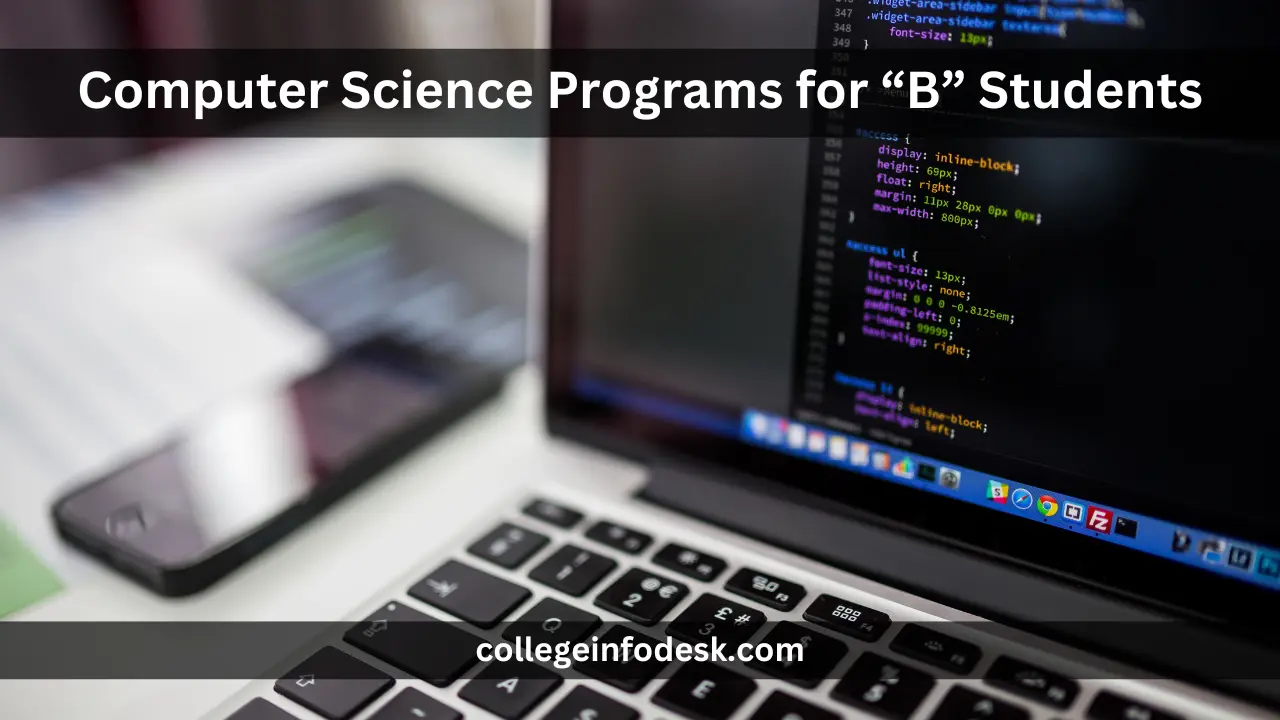In today’s digital age, the demand for skilled computer scientists and software engineers continues to soar. While many aspiring programmers dream of attending prestigious universities like Stanford or MIT, the reality is that admission to these elite institutions can be highly competitive, with stringent academic requirements. However, there are numerous computer science programs across the country that welcome students with diverse academic backgrounds and cultivate their talents over four years. In this article, we’ll explore these programs, highlighting their acceptance rates, student demographics, and standardized test score data to help “B” students assess their admissions chances and chart a path to success in the field of computer science.
Also read Best Computer Science Schools in the USA 2024
Understanding the Landscape
Before delving into specific computer science programs for “B” students, it’s important to understand the broader landscape of higher education in computer science. While top-tier universities like Stanford, Berkeley, and MIT may have low acceptance rates and high academic standards, there are many other institutions that prioritize diversity, inclusivity, and hands-on learning in their computer science programs. These programs offer opportunities for students with varying academic backgrounds to pursue their passion for technology and prepare for careers in the rapidly evolving field of computer science.
Exploring Alternative Pathways
For “B” students interested in computer science, there are numerous alternative pathways to pursue a degree and gain valuable skills and experience. These pathways may include attending public universities with strong computer science departments, enrolling in specialized technology institutes, or participating in coding bootcamps and online learning platforms.
Public universities like Cal Poly, the University of Central Florida, and UNC-Charlotte offer reputable computer science programs with diverse student populations and supportive learning environments. These institutions often prioritize hands-on projects, internships, and industry partnerships to prepare students for success in the tech industry.
Specialized technology institutes, such as the Rochester Institute of Technology (RIT) and DePauw University, provide focused training in computer science and related fields. These institutions may offer smaller class sizes, dedicated faculty, and state-of-the-art facilities to support student learning and research initiatives.
Coding bootcamps and online learning platforms offer intensive, short-term training programs designed to equip students with practical coding skills and industry certifications. While these programs may not offer traditional degrees, they can provide a fast-track pathway to entry-level positions in the tech industry for motivated individuals.
Assessing Admissions Chances
When evaluating computer science programs for “B” students, it’s important to consider factors such as acceptance rates, student demographics, and standardized test score data. While admission to competitive programs may be challenging for students with lower grades or test scores, many institutions prioritize holistic admissions criteria and consider factors such as extracurricular activities, personal statements, and letters of recommendation in their decision-making process.
Furthermore, “B” students should focus on highlighting their strengths, passions, and experiences in their application materials to demonstrate their potential for success in computer science. This may include showcasing relevant coursework, projects, internships, or volunteer work related to technology and programming.
Also see A Debt-Free Path to a Computer Science Degree at Lambda School
Strategies for Success
For “B” students aspiring to pursue a degree in computer science, there are several strategies for maximizing their admissions chances and achieving success in the field:
- Focus on building a strong foundation in math, science, and computer programming skills during high school to prepare for college-level coursework.
- Seek out opportunities for hands-on learning, such as internships, research projects, or coding competitions, to gain practical experience and demonstrate your passion for technology.
- Develop strong communication, problem-solving, and teamwork skills to excel in collaborative projects and navigate real-world challenges in the tech industry.
- Take advantage of resources and support services offered by colleges and universities, such as tutoring, academic advising, and career counseling, to enhance your academic performance and career readiness.
- Network with peers, faculty, alumni, and industry professionals to expand your professional network, explore career opportunities, and stay informed about industry trends and developments.
Conclusion
Computer science programs for “B” students offer diverse pathways and opportunities for success in the field of technology. By exploring alternative pathways, assessing admissions chances, and implementing strategies for success, “B” students can pursue their passion for computer science and prepare for rewarding careers in the tech industry. As the demand for skilled professionals in computer science continues to grow, it’s essential to recognize and support students from diverse academic backgrounds in their pursuit of excellence in this dynamic and exciting field.
